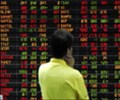

Asian share markets were volatile on Tuesday, after Australia’s central bank flagged some tapering in its quantitative easing programme and concerns over the future of China’s powerful technology sector weighed down shares.
U.S. markets were closed on Monday to mark the Independence Day holiday, leaving the Asian region without a strong lead to trading on Tuesday.
MSCI’s broadest index of Asia-Pacific shares outside Japan .MIAPJ0000PUS was down 0.1%.
In Hong Kong, the Hang Seng Index .HSI was down 0.44%, marking its sixth day of losses, while China’s CSI300 .CSI300 was off by nearly 0.6% to an almost two-month-low.
“Equities will continue to grind higher in Asia, but Hong Kong and China have been choppy for the past few days, I think China could remain weaker compared to the rest of Asia,” said Suresh Tantia, Credit Suisse’s senior investment strategist.
“China is still going through change … policy is still tightening and tech regulation is increasing, that will weigh on the market.”
Japan’s Nikkei .N225 was up 0.3% while the positive tone in the S&P ASX200 .AXJO earlier Tuesday reversed following the RBA’s decision to keep interest rates on hold.
The ASX200 was down nearly 0.3% after trading up by as much as 0.21% in the morning session. In South Korea, the Kospi 200 Index .KS200 rose 0.42% during the afternoon.
Chinese technology stocks remained under the microscope on Tuesday after the Cyberspace Administration of China ordered an investigation into Didi Global Holdings DIDI.N just days after it listed on the New York Stock Exchange.
“There is still lingering uncertainty from China’s tech companies and they are prominent in the Asian market, so that could be a cloud for market sentiment,” said Tai Hui, JPMorgan Assset Management chief Asia market strategist.
“The tech sector is very significant in Asia and we are not going to have a lot of clarity on the regulatory adjustments in China for the next few weeks or even months and (that) will be an important driver for the market.”
Investor appetite for Chinese tech companies could be tested by Xiaomi Corp 1810.HK mandating 12 banks on Tuesday to lead a potential U.S. dollar debt issuance.
In Australia, the prospect of more mergers and acquisitions activity has been flagged after a $16.7 billion bid for Sydney Airport Holdings Ltd SYD.AX from a pension fund consortium emerged on Monday.
“Sentiment appears to have almost moved past the (economic) reopening trade and into the outlook for corporate earnings that are coming up in August,” Karen Jorritsma, head of equities at RBC Capital Markets in Sydney told Reuters.
“Generally (earnings) season has been remarkably good, and with balance sheets in such great shape, the tide is turning to potential for M&A.”
The Reserve Bank of Australia kept the official cash rate on hold at a record low of just 0.1% and said it was likely to remain there until 2024, but investors were more focused on its stimulus tapering intentions.
The bank said it would continue purchasing government bonds past the present September deadline at a weekly pace of A$4 billion, rather than the current A$5 billion until at least mid-November.
Commonwealth Bank strategists said the RBA statement was less bullish than it had expected, which prompted a 5 basis point rise in the 10-year government bonds.
Globally, the publication of the U.S. Federal Reserve’s Federal Open Markets Committee minutes for June on Wednesday is highly anticipated by investors for guidance on whether ongoing emergency stimulus measures could start to be tapered.
Major European markets were in positive territory overnight despite a jump in the Brent crude LCOc1 price to above $77 a barrel, the highest level since October 2018.
The spike came after OPEC+ ministers called off discussions on Monday after clashing last week when the United Arab Emirates rejected a proposed eight-month extension to output curbs, meaning no deal to boost production has been agreed.
There has been no date set for the next meeting of ministers of OPEC+ countries – the Organization of the Petroleum Exporting Countries (OPEC) and allied producers including Russia – but sources told Reuters new discussions could begin in the next few days.
Elevated oil prices are adding to concerns that a higher global inflation rate could derail the post-coronavirus pandemic recovery under way in some major world economies.
Source: Reuters (Reporting by Scott Murdoch in Hong Kong; Editing by Kenneth Maxwell and Raju Gopalakrishnan)